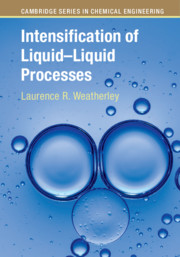Book contents
- Intensification of Liquid–Liquid Processes
- Cambridge Series in Chemical Engineering
- Intensification of Liquid–Liquid Processes
- Copyright page
- Contents
- 1 Introduction
- 2 Droplets and Dispersions
- 3 Mass Transfer
- 4 Membrane-Based and Emulsion-Based Intensifications
- 5 High Gravity Fields
- 6 Electrically Driven Intensification of Liquid–Liquid Processes
- 7 Intensification of Liquid–Liquid Coalescence
- 8 Ionic Liquid Solvents and Intensification
- 9 Liquid–Liquid Phase-Transfer Catalysis
- Index
- References
9 - Liquid–Liquid Phase-Transfer Catalysis
Published online by Cambridge University Press: 12 May 2020
- Intensification of Liquid–Liquid Processes
- Cambridge Series in Chemical Engineering
- Intensification of Liquid–Liquid Processes
- Copyright page
- Contents
- 1 Introduction
- 2 Droplets and Dispersions
- 3 Mass Transfer
- 4 Membrane-Based and Emulsion-Based Intensifications
- 5 High Gravity Fields
- 6 Electrically Driven Intensification of Liquid–Liquid Processes
- 7 Intensification of Liquid–Liquid Coalescence
- 8 Ionic Liquid Solvents and Intensification
- 9 Liquid–Liquid Phase-Transfer Catalysis
- Index
- References
Summary
Phase-transfer catalysis involves chemical reactions which occur in a two-phase liquid–liquid system and it has been shown to provide an effective method for organic synthesis. Phase-transfer catalytic reactions can facilitate high conversions and reaction selectivity and thus are consistent with the principles of green chemistry and process intensification. The basic mechanisms involved in phase-transfer catalysis and the related suite of reactions that involve catalytic transfer hydrogenations are briefly described and reviewed. The requirements and benefits of phase-transfer catalytic systems are summarized. Organic syntheses which exploit the principles of phase-transfer catalysis are described as examples of intensification. These include: synthesis of phenyl alkyl acetonitriles, transfer hydrogenations, alkyl oxidation and sulfonation reactions, etherification of cresols in a three-phase system, organic oxidations, nitrations, polymerizations, and organic condensation reactions. The enhancement of phase-transfer catalysis using other intensification methods, such as ultrasonics, is also described.
Keywords
Information
- Type
- Chapter
- Information
- Intensification of Liquid–Liquid Processes , pp. 341 - 364Publisher: Cambridge University PressPrint publication year: 2020
